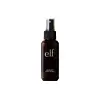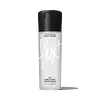e.l.f. cosmetics Makeup Mist & Set Spray Versus Mac Cosmetics Prep + Prime Fix+ Makeup Setting Spray
What's inside
What's inside
 Key Ingredients
Key Ingredients

 Benefits
Benefits

 Concerns
Concerns

 Ingredients Side-by-side
Ingredients Side-by-side

Water
Skin ConditioningPropylene Glycol
HumectantAmp-Acrylates/Allyl Methacrylate Copolymer
Phenoxyethanol
PreservativeCaprylyl Glycol
EmollientEthylhexylglycerin
Skin ConditioningTocopheryl Acetate
AntioxidantRetinyl Palmitate
Skin ConditioningPPG-26-Buteth-26
Skin ConditioningPEG-40 Hydrogenated Castor Oil
EmulsifyingButylene Glycol
HumectantCamellia Sinensis Leaf Extract
AntimicrobialAloe Barbadensis Leaf Extract
Emollient3-O-Ethyl Ascorbic Acid
Skin ConditioningCucumis Sativus Fruit Extract
EmollientWater, Propylene Glycol, Amp-Acrylates/Allyl Methacrylate Copolymer, Phenoxyethanol, Caprylyl Glycol, Ethylhexylglycerin, Tocopheryl Acetate, Retinyl Palmitate, PPG-26-Buteth-26, PEG-40 Hydrogenated Castor Oil, Butylene Glycol, Camellia Sinensis Leaf Extract, Aloe Barbadensis Leaf Extract, 3-O-Ethyl Ascorbic Acid, Cucumis Sativus Fruit Extract
 Reviews
Reviews

Ingredients Explained
These ingredients are found in both products.
Ingredients higher up in an ingredient list are typically present in a larger amount.
Butylene Glycol (or BG) is used within cosmetic products for a few different reasons:
Overall, Butylene Glycol is a safe and well-rounded ingredient that works well with other ingredients.
Though this ingredient works well with most skin types, some people with sensitive skin may experience a reaction such as allergic rashes, closed comedones, or itchiness.
Learn more about Butylene GlycolCamellia Sinensis Leaf Extract is derived from the leaves of the tea plant. Black tea, green tea, and oolong tea are all harvested from this plant.
This ingredient has many skin benefits:
This ingredient contains polyphenols, a strong antioxidant. Antioxidants help fight off molecules that damage skin cells.
On top of that, the antioxidants in green tea neutralize free-radicals from the sun. This gives the skin some extra UV protection, but should not replace sunscreen.
Many components of tea have anti-inflammatory properties.
Polyphenols and L-theanine help soothe the skin and reduce irritation. The caffeine in Camellia Sinensis Leaf Extract helps calm inflamed blood vessels.
Other compounds found in tea include: Vitamin Bs, linoleic acid, magnesium, calcium, iron, and zinc.
Research has shown both drinking Camellia Sinensis Leaf Tea and applying it to the skin can help boost skin elasticity and hydration. Studies also show using tea extract may reduce sebum, or oil, production.
Learn more about Camellia Sinensis Leaf ExtractThis extract comes from cucumber. Cucumbers are mostly made up of water (95%), and the other 5% is composed of: vitamin C, caffeic acid, fatty acids, amino acids, and other minerals.
Cucumbers have anti-inflammatory, barrier repair, and hydrating properties.
They contain shikimate dehydrigenase, an enzyme shown to help reduce inflammation and soothe the skin.
The amino acids found in cucumbers help nourish our skin's natural acid mantle (it's an important part of our skin barrier). This slightly acidic film acts as a barrier to protect us from bacteria, viruses, and other contaminants.
Unless you have an allergy to cucumbers, this is generally a non-irritating ingredient.
Fun fact: Cucumis Sativus is native to South Asia and can now be found on every continent.
Learn more about Cucumis Sativus Fruit ExtractPeg-40 Hydrogenated Castor Oil is derived from castor oil and polyethylene glycol (PEG). It is used as a emollient and emulsifier.
As an emulsifier, it helps prevent ingredients from separating. It also helps make the other ingredients more soluble; it is often used to solubilize fragrances. This increases spreadability and elongates shelf life in a product.
Emollients help soothe and soften the skin. They do this by creating a protective film on your skin. This barrier helps trap moisture and keeps your skin hydrated. Emollients may be effective at treating dry or itchy skin.
This ingredient may or may not be vegan, depending on the source.
Peg-40 Hydrogenated Castor Oil may not be fungal-acne safe. We recommend speaking with a professional if you have any questions or concerns.
Learn more about PEG-40 Hydrogenated Castor OilPhenoxyethanol is a preservative that has germicide, antimicrobial, and aromatic properties. Studies show that phenoxyethanol can prevent microbial growth. By itself, it has a scent that is similar to that of a rose.
It's often used in formulations along with Caprylyl Glycol to preserve the shelf life of products.
We don't have a description for PPG-26-Buteth-26 yet.
Tocopheryl Acetate is AKA Vitamin E. It is an antioxidant and protects your skin from free radicals. Free radicals damage the skin by breaking down collagen.
One study found using Tocopheryl Acetate with Vitamin C decreased the number of sunburned cells.
Tocopheryl Acetate is commonly found in both skincare and dietary supplements.
Learn more about Tocopheryl AcetateWater. It's the most common cosmetic ingredient of all. You'll usually see it at the top of ingredient lists, meaning that it makes up the largest part of the product.
So why is it so popular? Water most often acts as a solvent - this means that it helps dissolve other ingredients into the formulation.
You'll also recognize water as that liquid we all need to stay alive. If you see this, drink a glass of water. Stay hydrated!
Learn more about Water